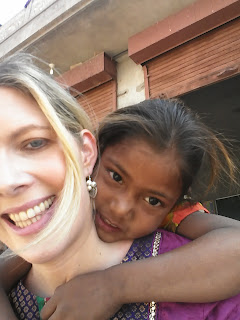It's really difficult to know where to begin with this post because there is just so much to say and I can honestly say that my last few weeks as a teacher with a Street Children Education program here in Jaipur in Rajasthan have been some of the most memorable of my life. Working with these children has been an absolute pleasure and I have learned far more about India as a country and it's diversity and culture than I ever would have travelling around from place to place. Probably the biggest life lesson I've taken from this whole experience however has been just how little we really need in order to be happy. When I see how these children live (literally under sheets of plastic) with large families, practically no possessions and very little to eat and the energy, fun and enormous smiles they bring to school every single day, it really does put things into perspective.
With more than 1.2 billion people, India's cities are literally bursting at the seams, to put it into perspective, while India itself only covers 2.5% of the worlds landmass, it's actual population exceeds more than 15 percent of the entire planets population. As a result of this villagers from more rural inland areas will migrate with their entire families to larger towns and cities in order to find work and a better life. They form low income housing projects usually alongside major roads into towns and cities. These slum dwellings are present throughout India and usually consist of simple structures made from bits of wood & sheets of plastic, supported by rough wooden stakes. If lucky they might have one charpoy rope bed for all the family but in most cases families sleep directly on the ground on plastic. Possessions are few and consist of a few clothes, pots and pans, plastic containers for storing water and maybe a basin for bathing in. Surprisingly enough many of these 'houses' while little more than temporary shed like structures, still have a TV set wired up, how they power them I still have absolutely no idea.The people who live here are usually the very poorest of the poor, uneducated & often illiterate, their entire lives are played out in public, from child rearing to bathing, to eating, and sleeping, everything takes place at the side of the road. They will often move together with others from their own village, so within the slums there are very separate & distinct communities with people from the same village sticking together and looking out for each-other. In fact I've seen with our kids in school that there is quite a bit of rivalry between villages and the kids generally get on better with other kids from their own village (who they are usually related to).
 |
| Kids playing at break-time in the class-room |
Due to their extreme poverty these parents do not have the means to send their children to a state run school. In fact in most cases the children are needed 'at home' in order to help mind their younger siblings while the parents go out to work. The children themselves are often used to help bring in an income for the family. They are employed in street vending, collecting firewood, domestic labor and tenting to animals.
The most common job that I have personally seen them doing here in Jaipur is rag-picking. India has a massive sanitation problem because there is no proper rubbish disposal system in operation, usually they will just set fire to the big piles of rubbish that dot the streets. In fact the sweet smoky smell of burning rubbish has been a constant backdrop to my last few weeks here in India. Children as young as six years old (if not younger) patrol these rubbish piles in order to collect recyclable materials or anything they can sell. You will usually see them carrying heavy loads over their shoulders in sacks or if they are lucky across the handlebars of a bike. I have seen children dangerously jumping right inside enclosed skips and down on their hands and knees alongside wild pigs, cows and dogs searching through rubbish tips. It really is a very sad sight but one which has almost become normal to me now because it is just so common here. When I first came to India I was really shocked at just how young some of these children actually are, literally babies working and caring for babies. On my first day in Delhi when my rickshaw pulled up at traffic lights, a group of street children came over to me begging, one little girl of about seven years old had a tiny little baby covered in dust from the traffic & pollution in her arms, he couldn't have been much more than one years old and he just looked so tired and solemn as though at the tender age of one he was well used to the drill. It brought home to me how difficult their lives are from the very moment they are born into this life of poverty. Left to roam the streets unsupervised, with not a parent or guardian in sight, you can see just how vulnerable these innocent little children are to unscrupulous individuals & the local mafia.
 |
| Young boy rag-picking across rd from house where I'm staying. |
I'll write more about day-to-day school and my own personal experiences with the kids in my next post.
 |

No comments:
Post a Comment